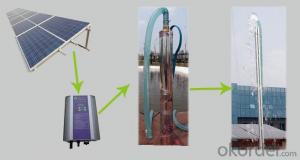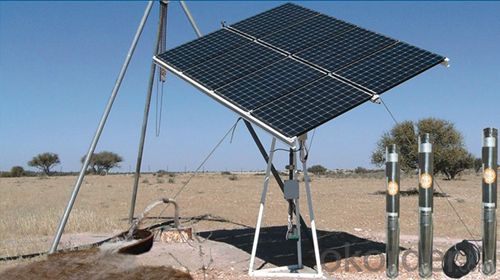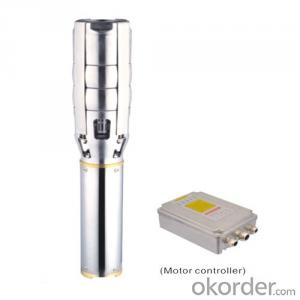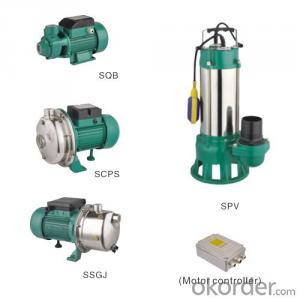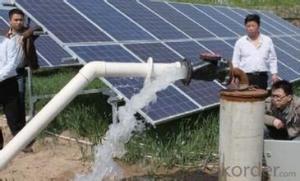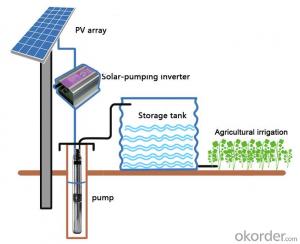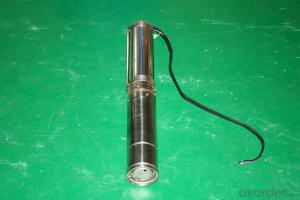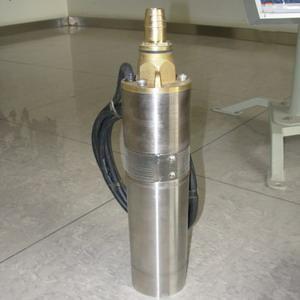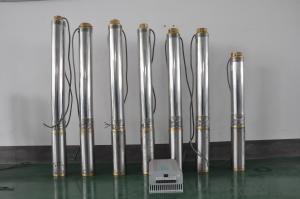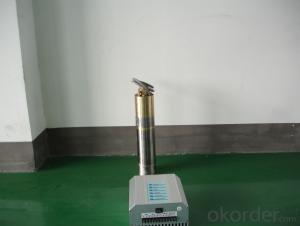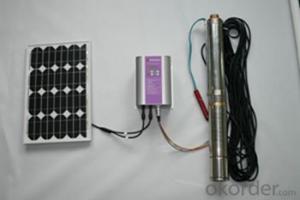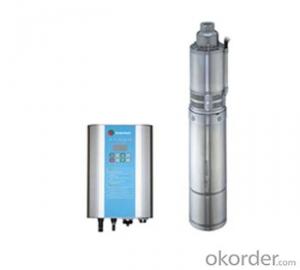Submissive Solar Water Pumping Solar Power Submersible Pump
- Loading Port:
- Shanghai
- Payment Terms:
- TT OR LC
- Min Order Qty:
- 1 set
- Supply Capability:
- 1000 set/month
OKorder Service Pledge
OKorder Financial Service
You Might Also Like
Solar Water Pumping Solar Power Pumps Submersible Pump
DC solar water pumping system consists of the motor, pump, controller, solar array and some other accessories, such as water level sensor, float switch, etc. Considered that storing water is more efficient than storing electricity, the system is designed to directly drive the pump without battery which can reduce the construction and operating cost and routine maintenance effectively.The PV array consists of multiple solar panels connected in series/parallel, which can supply the whole system as power source by converting the absorbed solar radiation energy to the electrical energy. The pump driven by a brushless DC permanent magnet motor draws water from deep-well or river. The pumped water is then fed into reservoir or water tank, or connected to the irrigation system or fountain system directly.
Advanced Technology
Applications Innovation
The efficiency of DC brushless permanent magnet motor has been increased up to 25% in comparison with traditional asynchronous motor.
Technology Innovation
Stator and rotor are sealed by environment friendly casting resin.Motor insulation resistance can be hold higher than 300MΩfor more than 10 years, which consumedly increased the security and reliability of the submersible motor.
Structure Innovation
Casting resign technology processed stator and rotor as well as the water lubricated bearing make the submersible pump environment friendly.
Feature
High Efficiency & High Reliability
DC Brushless Permanent Magnet Motor
Minimum Maintenance, long Service Life
Environment Friendly Materials, Lubricated Without Oil
Application
Village or Family Water Supply
Animal Drinking Water & Livestock Watering
Garden/Courtyard Irrigation
Swimming Pool
Water Supply for Bivouac or Camping Car
Water Supply for Remote Area
Automatic Control
Operate Automatically, No Need Watching
Maximum Power Point Tracking (MPPT)
Dry-run Protection
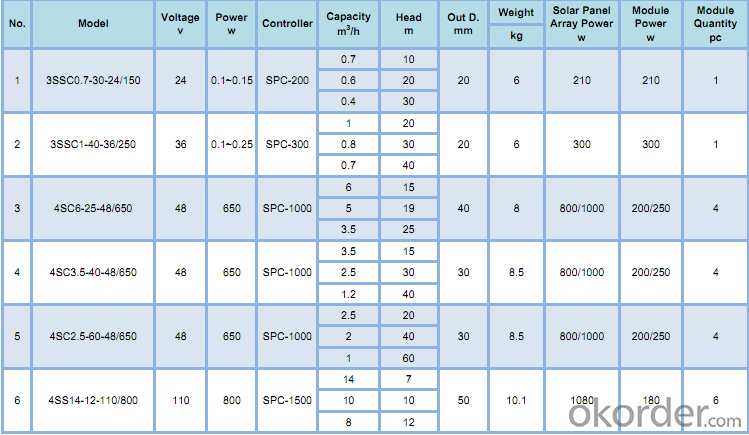
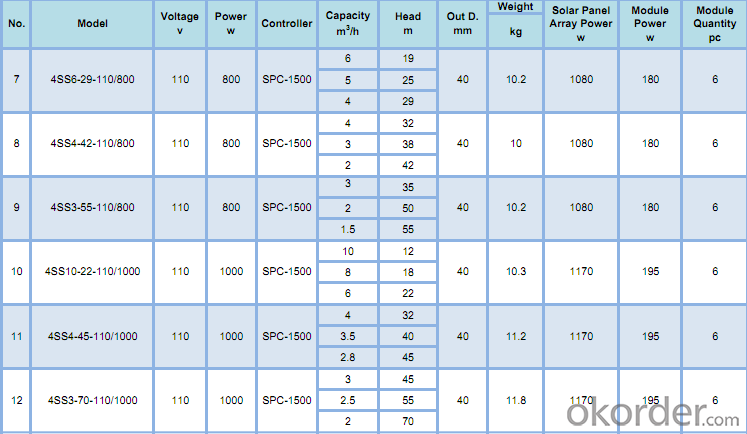
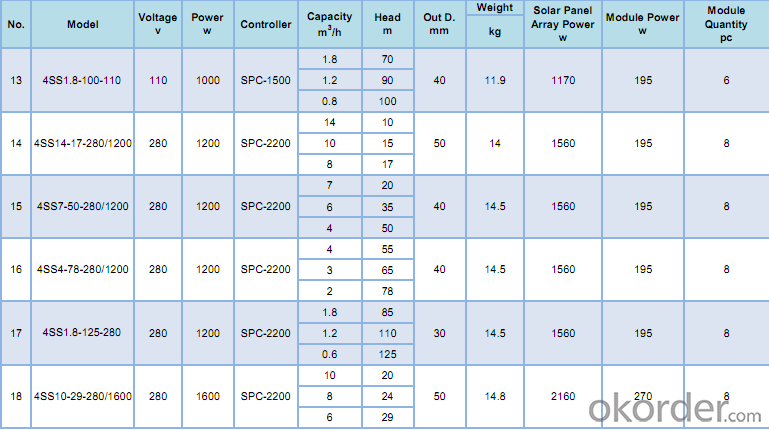
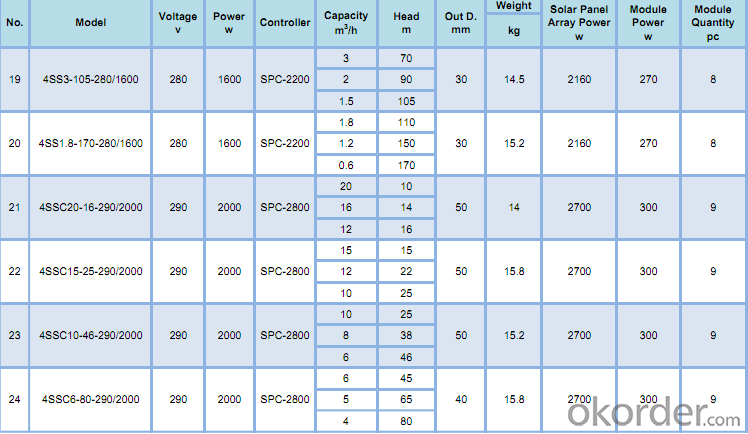
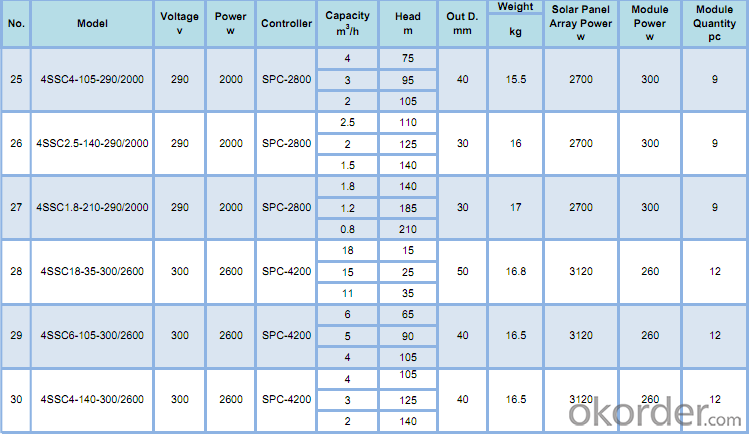
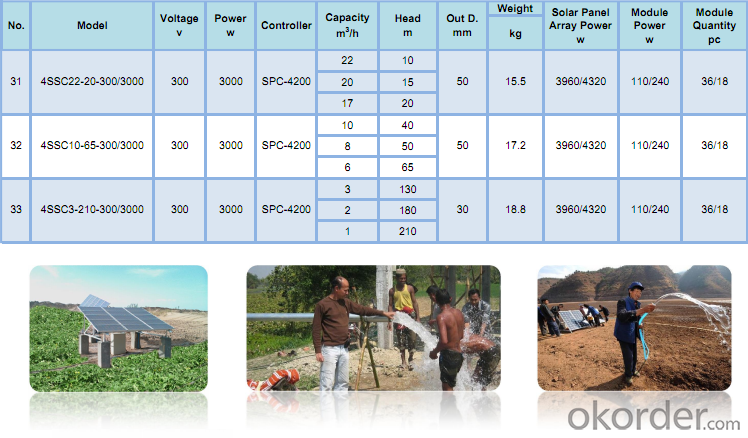
- Q: What is the minimum sunlight requirement for a solar pump to function?
- The minimum sunlight requirement for a solar pump to function varies depending on the specific model and its efficiency, but in general, most solar pumps require a minimum of 4 to 6 hours of direct sunlight per day to operate effectively.
- Q: Can a solar pump be used for irrigation in hilly or sloping terrains?
- Yes, a solar pump can be used for irrigation in hilly or sloping terrains. Solar pumps are versatile and can be installed in various locations, including hilly or sloping terrains. These pumps use solar energy to power them, which means they do not require a connection to the grid or fuel to operate. This makes them highly suitable for remote and challenging terrains. Additionally, solar pumps can be installed at different levels to cater to the varying terrain, ensuring efficient water distribution across the slope. They can provide a sustainable and environmentally friendly solution for irrigation needs in such terrains, reducing the reliance on conventional energy sources and minimizing the carbon footprint.
- Q: What is the lifespan of a solar pump controller?
- The lifespan of a solar pump controller can vary depending on several factors. These factors include the quality of the controller, the operating conditions, and how well it is maintained. Generally, a well-made and properly maintained solar pump controller can last anywhere from 10 to 20 years. However, it is important to note that some controllers may have a shorter lifespan due to lower quality materials or components. Operating conditions also play a significant role in determining the lifespan of a solar pump controller. Extreme temperatures, excessive moisture, and exposure to harsh elements can all contribute to the degradation of the controller over time. Therefore, it is recommended to install the controller in a protected environment and ensure proper ventilation to prevent overheating. Regular maintenance is crucial for maximizing the lifespan of a solar pump controller. This includes cleaning the controller regularly, checking for any loose connections, and ensuring that the firmware and software are updated when necessary. Additionally, it is important to perform routine inspections to identify any signs of wear or damage and address them promptly to prevent further issues. In summary, the lifespan of a solar pump controller can range from 10 to 20 years, depending on factors such as quality, operating conditions, and maintenance. Taking proper care of the controller and addressing any issues in a timely manner can help extend its lifespan and ensure efficient operation of the solar pumping system.
- Q: Can solar pumps be used for water supply in remote oil or gas exploration sites?
- Yes, solar pumps can be used for water supply in remote oil or gas exploration sites. Solar pumps are a sustainable and cost-effective solution that can operate independently from the grid, making them ideal for remote locations. They can effectively pump and supply water for various purposes such as drilling operations, equipment cooling, and personnel needs at these sites. Additionally, the use of solar pumps reduces the reliance on fossil fuels, minimizing the environmental impact associated with traditional water pumping methods.
- Q: Are there any restrictions on the use of a solar pump in residential neighborhoods?
- There may be restrictions on the use of a solar pump in residential neighborhoods, depending on local regulations and homeowner association rules. It is important to check with the local authorities or neighborhood association to determine if there are any specific restrictions or requirements for using a solar pump. Some potential restrictions could include noise limitations, height restrictions, or aesthetic considerations. Additionally, permits or approvals may be required before installing a solar pump in a residential area. It is always advisable to consult with the relevant authorities or neighborhood association to ensure compliance with any restrictions or guidelines in place.
- Q: Can a solar pump be used for water supply in remote mining sites?
- Yes, a solar pump can be used for water supply in remote mining sites. Solar pumps are ideal for such locations as they do not require a connection to the electric grid and can operate efficiently using solar energy. They can provide a reliable and sustainable water supply solution for mining operations in remote areas.
- Q: How does a solar pump handle water with high levels of total dissolved solids?
- A solar pump can handle water with high levels of total dissolved solids by utilizing a filtration system. The pump draws water from the source and passes it through a series of filters that are capable of removing or reducing the concentration of dissolved solids. This ensures that the water being pumped is of acceptable quality for various applications, such as irrigation or drinking water.
- Q: Are there different types of solar pumps available?
- Yes, there are various types of solar pumps available, including submersible solar pumps, surface solar pumps, and solar-powered irrigation systems. Each type is designed for specific applications and offers different features and benefits.
- Q: Can a solar pump be used for livestock watering?
- Yes, a solar pump can be used for livestock watering. Solar pumps are a sustainable and cost-effective solution for providing water to livestock in remote areas where electricity may not be readily available. These pumps harness energy from the sun to power their operation, making them an environmentally friendly option. They can be used to pump water from wells, boreholes, or other water sources to provide a reliable supply for livestock watering.
- Q: What is the payback period for investing in a solar pump?
- The payback period for investing in a solar pump can vary depending on various factors such as the initial cost of the pump, installation expenses, energy savings, and any applicable incentives or subsidies. Generally, the payback period for a solar pump ranges from 3 to 7 years. During this period, the cost savings from using solar energy instead of traditional energy sources, such as electricity or diesel, will gradually offset the initial investment. As solar energy is essentially free once the system is installed, the operating costs will be significantly reduced, resulting in long-term financial benefits. It is essential to consider the local climate and the water requirements for your specific application when estimating the payback period. In areas with ample sunlight and high water demands, the payback period may be shorter due to increased energy savings. Conversely, in regions with less sunlight or lower water requirements, the payback period may be slightly longer. Moreover, government incentives, tax credits, or grants for investing in renewable energy systems can significantly impact the payback period. These financial incentives can help reduce the initial investment and accelerate the payback period, making solar pumps even more economically viable. To accurately determine the payback period for a solar pump, it is recommended to consult with solar energy experts or suppliers who can assess your specific needs, estimate the costs, and provide a more precise calculation based on your location and circumstances.
Send your message to us
Submissive Solar Water Pumping Solar Power Submersible Pump
- Loading Port:
- Shanghai
- Payment Terms:
- TT OR LC
- Min Order Qty:
- 1 set
- Supply Capability:
- 1000 set/month
OKorder Service Pledge
OKorder Financial Service
Similar products
Hot products
Hot Searches
Related keywords
